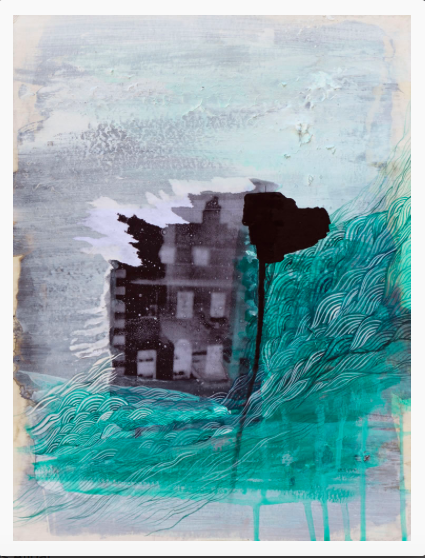
Memories Afloat by Alia Bilgrami. Image courtesy of the artist.
Translated from Hungarian by Erika Mihálycsa
“Why does God demand sacrifice of man and not angels?â€
~ Martin Buber/Olga Marx, ‘Tales of the Hasidim’
I was left alone at fortythree in forty-
five. Alone with the painkillers,
the sedatives, the morphine. With the make-
up mirror. With my nurse’s degree and the fiftyish,
bespectacled internist in the office. Alone without my
husband, little daughter, parents, close and collateral
relations. With the Körös riverbanks and the laughter of children swaying from
willow branches till they drop in the water, with my dead class-
mates’ faces on the yearbook picture full of gaps.
With our friends burnt to ashes. With the funny rs
of the Wehrmacht officer: “kann ich Ihnen irrrgendwas helfen?“
“Ja, bitte. I beg you bring them back from
Auschwitz.†I rush home on high heels, shiver
craving the needle in my arm laced with blue
veins. My tresses all afloat, my blue eyes
misting over. Blue, blue, Mary-blue.
I drink green English tea from green Meissen
cups. Green like the trees in spring. Buchenwald:
Beechwood. Tanzen und singen, singen und springen.
Yellow light dawns through the window shades.
I rest, blissfully, in the yellow sun. I hear their wooden
clogs grating on the yellow sand.
“It’s not so bad to be dead,†they flounder.
“We can be where we want to, where we are called back.
We came in two: you called two of us in the same breath.
Here airways are free, we all hover
together. Nothing hurts. We only miss
you. We don’t feel the kicks. The pangs
of hunger. Dampness trickling down the bones.
It’s like watching our story in a film. If you didn’t
bring it up we wouldn’t know it’s ours.
Call me yet. Ask for me on the office telephone.
Let them hear my name and remember I have lived.
Buy some kaiser rolls at the baker’s, tell him it’s for your
daughter. Remind him to put in a few slices of ham.â€
“My husband and daughter visited me yesterday,â€
I tell the next day. “It’s not so bad to be dead
they say.†The internist takes my arm in his hands.
The mystery of the morphine’s disappearance is solved. “I’m afraid
they will run out of arguments in the end and get fed up
with being dead,†I add, “or that I realize they are
right. I’m afraid of them. I long for them.â€
“M. M., I will cure you,†he tells me twice
but I don’t want to hear my name uttered twice any-
more. Let one time be enough.
I am at his service all day long but he should not
want me to feel that he craves or perhaps loves me.
God has taken out my soul, cleansed it, and like
washerwomen at the creek, He soaped it over, beat it,
scrubbed and rinsed and dried and mangled it,
then placed it back, clean. I was seized by hope, I re-
married, moved out of my rented flat. A girl
was born to me. I became a grandmother. The mayor
visited me on my hundredth birthday.
I showed him a few pictures. But I remember
having another life of which no picture
is found in any drawer. A former
husband and a former child? I dare not
ask. What if they answer, yes?
After he had made fire in the oven, the servant
started praying. But the log flared up with a
spark. “Fire!†the others cried out, “why didn’t you watch
over it?†“It is written in the Scripture: and the fire
was quenched,†he answered. And lo, it subsided.
Where have I read this? God has left me here for good.
I am confined to bed but everybody loves me.
They cut up my bread, pour coffee in my cup.
I suggested we visit my native town. They said
the trains were halted because of the heavy snowfall.
So much the better, I’m terrified of trains. My granddaughter
laughs at me: flying is more dangerous but she will fly all the same.
Am I a coward? I commune with death every day.
I’m more afraid of people. I will not cover
my brow when the Reader of Faces looks upon me.
But they pull their hats down to their noses. I open
a book every day but never turn the page.
One word is enough for me to muse over for hours.
At such moments one of my daughters sits on my
bed and reads out from the paper. If I live to be a hundred
and eight I will be the oldest Hungarian alive,
they say and laugh. I caress their happy child-faces.
I had wanted to throw the world away from me, but
is the world mine, that I can throw it away?
~ Zsuzsa Takács




